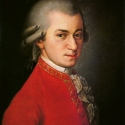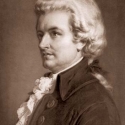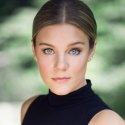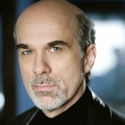The Marriage of Figaro

|
Wolfgang Amadeus MozartComposer |
Wolfgang Amadeus Mozart was born on January 27, 1756, in Salzburg, Austria. Mozart's father, Leopold Mozart, a noted composer, instructor, and the author of famous writings on violin playing, was then in the service of the archbishop of Salzburg. Leopold and Anna Maria, his wife, stressed the importance of music to their children. Together with his sister, Nannerl, Mozart received such intensive musical training that by the age of six he was a budding composer and an accomplished keyboard performer. In 1762 Leopold presented his son as performer at the imperial court in Vienna, Austria, and from 1763 to 1766 he escorted both children on a continuous musical tour across Europe, which included long stays in Paris, France, and London, England, as well as visits to many other cities, with appearances before the French and English royal families.
Mozart was the most celebrated child prodigy of this time as a keyboard performer. Mozart also made a great impression as a composer and improviser. In London, Mozart won the admiration of musician Johann Christian Bach (1735–1782), and was exposed from an early age to an unusual variety of musical styles and tastes across Europe.
From the age of ten to seventeen, Mozart's reputation as a composer grew to a degree of maturity equal to that of most older established musicians. Mozart spent the years from 1766 to 1769 at Salzburg writing instrumental works and music for school dramas in German and Latin, and in 1768 he produced his first real operas: the German Singspiel Bastien und Bastienne. Despite his growing reputation, Mozart found no suitable post open to him; and his father once more escorted Mozart, at age fourteen (1769), and set off for Italy to try to make his way as an opera composer.
In Italy, Mozart was well received: in Milan, Italy, he obtained a commission for an opera; in Rome he was made a member of an honorary knightly order by the Pope; and at Bologna, Italy, the Accademia Filarmonica awarded him membership despite a rule normally requiring candidates to be twenty years old. During these years of travel in Italy Mozart produced his first large-scale settings of opera seria: Mitridate (1770), Ascanio in Alba (1771), and Lucio Silla (1772), as well as his first string quartets. At Salzburg in late 1771 Mozart renewed his writing of Symphonies (Nos. 14–21).
Paris was a vastly larger theater for Mozart's talents. His father urged him to go there, for "from Paris the fame of a man of great talent echoes through the whole world," he wrote his son. But after nine difficult months in Paris, from March 1778 to January 1779, Mozart returned once more to Salzburg, having been unable to secure a foothold and depressed by the entire experience, which had included the death of his mother in the midst of his stay in Paris. Unable to get hired for an opera, Mozart wrote music to order in Paris, again mainly for wind instruments: the Sinfonia Concertante for four solo wind instruments and orchestra, the Concerto for flute and harp, other chamber music, and the ballet music Les Petits riens. In addition, Mozart began giving lessons to make money.
Mozart's years in Vienna, from age twenty-five to his death at thirty-five, cover one of the greatest developments in a short span in the history of music. In these ten years Mozart's music grew rapidly beyond the realm of many of his contemporaries; it exhibited both ideas and methods of elaboration that few could follow, and to many, the late Mozart seemed a difficult composer.
The major instrumental works of this period bring together all the fields of Mozart's earlier activity and some new ones: six symphonies, including the famous last three: no. 39 in E-flat Major, no. 40 in G Minor, and no. 41 in C Major (the Jupiter —a title unknown to Mozart). Mozart finished these three works within six weeks during the summer of 1788, a remarkable feat even for him.
In the field of the string quartet Mozart produced two important groups of works that completely overshadowed any he had written before 1780: in 1785 he published the six Quartets (K. 387, 421, 428, 458, 464, and 465) and in 1786 added the single Hoffmeister Quartet (K. 499). In 1789 he wrote the last three Quartets (K. 575, 589, and 590), dedicated to King Frederick William (1688–1740) of Prussia, a noted cellist.
Mozart's development as an opera composer between 1781 and his death is even more remarkable, perhaps, since the problems of opera were more far-ranging than those of the larger instrumental forms and provided less adequate models. The first important result was the German Singspiel entitled Abduction from the Seraglio (1782). Mozart then turned to Italian opera. Mozart produced his three greatest Italian operas: The Marriage of Figaro (1786), Don Giovanni (1787), and Cosi fan tutte (1790). In his last opera, The Magic Flute (1791), Mozart turned back to German opera and produced a work combining many strands of popular theater and including musical expressions ranging from folk to opera.
On concluding The Magic Flute, Mozart turned to work on what was to be his last project, the Requiem. This Mass had been commissioned by a benefactor said to have been unknown to Mozart, and he is supposed to have become obsessed with the belief that he was, in effect, writing it for himself. Exhausted, Mozart managed to finish the first two movements and sketches for several more, but the last three sections were entirely lacking when he died. It was completed by his pupil Franz Süssmayer after his death, which occurred in Vienna, Austria, on December 5, 1791.

|
Lorenzo Da PonteLibrettist |
Lorenzo Da Ponte was born Emanuele Conegliano in 1749 in Ceneda, in the Republic of Venice (now Vittorio Veneto, Italy). Da Ponte was Jewish by birth and the eldest of three sons. In 1764, Da Ponte's father, Geronimo Conegliano, then a widower, converted himself and his family to Roman Catholicism in order to marry a Catholic woman. Emanuele, as was the custom, took the name of Lorenzo Da Ponte from the Bishop of Ceneda who baptized him.
Thanks to the bishop, the three Conegliano brothers studied at the Ceneda seminary. The bishop died in 1768, after which Da Ponte moved to the seminary at Portogruaro, where he took Minor Orders in 1770 and became Professor of Literature. Da Ponte was ordained a priest in 1773 and began writing poetry in Italian and Latin, including an ode to wine, "Ditirambo sopra gli odori".
In 1773 Da Ponte moved to Venice, where he made a living as a teacher of Latin, Italian, and French. Although he was a Catholic priest, the young Da Ponte led a dissolute life. While priest of the church of San Luca, Da Ponte took a mistress, with whom he had two children. At Da Ponte's 1779 trial, where he was charged with "public concubinage" and "abduction of a respectable woman," it was alleged that he had been living in a brothel and organizing the entertainments there. Da Ponte was found guilty and banished for fifteen years from Venice.
Lorenzo Da Ponte moved to Gorizia, then part of Austria, where he lived as a writer, attaching himself to the leading noblemen and cultural patrons of the city. In 1781 Da Ponte falsely believed that he had an invitation from his friend Caterino Mazzolà, the poet of the Saxon court, to take up a post at Dresden, only to be disabused when he arrived there. Mazzolà however offered Da Ponte work at the theatre translating libretti and recommended that he seek to develop writing skills. He also gave Da Ponte a letter of introduction to the composer Antonio Salieri.
With the help of Salieri, Da Ponte applied for and obtained the post of librettist to the Italian Theatre in Vienna. Here Da Ponte also found a patron in the banker Raimund Wetzlar von Plankenstern, benefactor of Wolfgang Amadeus Mozart. As court poet and librettist in Vienna, Da Ponte collaborated with Mozart, Salieri, and Vicente Martín y Soler. Da Ponte wrote the libretti for Mozart's most popular Italian operas, The Marriage of Figaro (1786), Don Giovanni (1787), and Così fan tutte (1790), and Soler's Una cosa rara, as well as the text on which the cantata Per la ricuperata salute di Ofelia (collaboratively composed in 1785 by Salieri, Mozart, and Cornetti) is based. All of Da Ponte's works were adaptations of pre-existing plots, as was common among librettists of the time, with the exceptions of L'arbore di Diana with Soler, and Così fan tutte, which he began with Salieri, but completed with Mozart. However the quality of Da Ponte elaboration gave them new life.
In the United States, Da Ponte settled in New York City first, then Sunbury, Pennsylvania, where he briefly ran a grocery store and gave private Italian lessons. Da Ponte returned to New York to open a bookstore. Da Ponte became friends with Clement Clarke Moore, and, through him, gained an unpaid appointment as the first professor of Italian literature at Columbia College. In New York Da Ponte introduced opera and produced in 1825 the first full performance of Don Giovanni in the United States, in which Maria García (soon to marry Malibran) sang Zerlina. Da Ponte also introduced Gioachino Rossini's music in the United States, through a concert tour with his niece Giulia Da Ponte.
Lorenzo Da Ponte died in 1838 in New York.

|
Dean WilliamsonConductor |
Dean Williamson, music director of Nashville Opera, is widely known for his perceptive and commanding conducting. He was artistic director of Opera Cleveland and was the founder and music director of Seattle Opera’s Young Artist Program.
This past season he made a highly successful Lincoln Center debut with the New York City Opera. He has conducted at many regional companies, including Seattle Opera, Minnesota Opera, Wolf Trap Opera Company, Opera Theatre of St. Louis, Des Moines Metro Opera, Lyric Opera of Boston, San Francisco Opera/Merola, Opera Colorado, Chautauqua Opera, and Manitoba Opera..
With Nashville Opera, he has recently released two studio opera recordings by Michael Nyman and Carly Simon on Naxos. His video recording of Le Comte Ory with Des Moines Metro Opera earned an Emmy nomination.

|
Tara FairclothDirector |
Stage Director Tara Faircloth’s work has been seen in opera houses around the nation. Critics hailed Faircloth's recent directorial debut at Lyric Opera of Chicago: a “wickedly funny, elegantly sung, cleverly directed production of Rossini’s The Barber of Seville.” In recent seasons, Faircloth created new productions of The Little Prince (Utah Opera), Ariadne auf Naxos (Wolf Trap Opera), Il re pastore (Merola Opera), Agrippina (Ars Lyrica Houston), and The Coronation of Poppea (Boston Baroque).
The 2021/22 Season found Faircloth working on several new productions, including Emmeline with Tulsa Opera, La Traviata at Opera Santa Barbara and The Merry Wives of Windsor with The Juilliard School, as well as a program with Ars Lyrica Houston entitled “Eternity and the Underworld” which paired Jonathan Dove’s The Other Euridice and Bach’s Ich habe genug. In addition, Faircloth revisited her old favorite The Barber of Seville in a debut at The Dallas Opera.
Faircloth has a thriving career in regional houses such as Utah Opera, Wolf Trap Opera, Arizona Opera, Tulsa Opera, and Atlanta Opera (The Barber of Seville, Rigoletto, The Magic Flute, Hansel and Gretel, etc.). The baroque repertoire is of special interest to Faircloth, who made her directorial debut with Ars Lyrica Houston’s production of Cain: Il primo omicidio in 2003 and has since designed and directed a number of shows for the company including Charpentier’s Actéon and La descente d’Orphée aux enfers. Faircloth created productions of Dido and Aeneas for Ars Lyrica at the Festival di Musica Barroca in San Miguel de Allende, Mexico, and for Mercury Baroque in collaboration with the Dominic Walsh Dance Theater.
Recent seasons for Faircloth have included new productions of Il re pastore with Merola Opera, Agrippina with Ars Lyrica Houston, The Little Prince with Utah Opera, The Coronation of Poppea with Boston Baroque, Eugene Onegin with Arizona Opera, and Britten’s A Midsummer Night’s Dream with Boston University. Additionally, Faircloth has directed new productions of Madame Butterfly with Wolf Trap Opera, L’enfant et les sortileges with Utah Symphony & Opera, Don Giovanni with Arizona Opera, and a reconfiguration of her 2014 Wolf Trap Carmen for Arizona Opera.
Faircloth has worked extensively on the directing staff of such companies as Lyric Opera of Chicago, Houston Grand Opera, Central City Opera, and Dallas Opera, and as such, has worked on some of the most complicated operas in the repertoire, assisting international directors and preparing cover casts of some of the best performers in our industry. Passionate about dramatic training for young singers, Faircloth is the Drama Instructor for the Houston Grand Opera Studio and HGO's Young Artists’ Vocal Academy and has served as a guest coach at Wolf Trap Opera Studio, Des Moines Metro Opera, University of Michigan, and Rice University. Faircloth splits her time between Austin and Houston, Texas, where she enjoys restoring her 1935 Craftsman Bungalow.

|
Zachary NelsonCount Almaviva |
Zachary Nelson, a native of Annapolis, Maryland, studied vocal performance at The Catholic University of America, and later the prestigious Academy of Vocal Arts in Philadelphia.
The 2023/24 Season will feature a return to Atlanta Opera as Marcello in La Bohème and performances of Beethoven’s 9th Symphony, and excerpts as the title role of Berg’s Wozzeck with Utah Symphony. Recent and career highlights include his role debut as Alberich in Das Rheingold with Atlanta Opera; Marcello in La Bohème with Lyric Opera of Chicago; the title role in The Marriage of Figaro, Enrico in Lucia di Lammermoor, Malatesta in Don Pasquale, and Marcello in La Bohème all with Santa Fe Opera; the title role in Sweeney Todd with Des Moines Metro Opera; and Escamillo in Carmen with Den Norske Opera in Oslo, Canadian Opera Company and San Francisco Opera.
Last season, Nelson made an anticipated role debut as Alberich in Atlanta Opera’s new production of Das Rheingold. Additionally, Nelson sang Mercutio in productions of Roméo and Juliette with Florentine Opera and Opera San Antonio, returned to the role of Leporello in Don Giovanni with North Carolina Opera, and joined the Lubbock Symphony as Sharpless in Madame Butterfly.
In the 2021/22 Season, Nelson joined the Lyric Opera of Chicago for its production of The Elixir of Love, sang Escamillo in Carmen with Palm Beach Opera, and performed Marcello in La Bohème with both New Orleans Opera and the Jacksonville Symphony.
During the COVID-19 impacted 2020/21 Season, Nelson’s engagements included Conte Almaviva in The Marriage of Figaro with Opera Omaha (cancelled), Marcello in La Bohème with the Jacksonville Symphony Orchestra (postponed), and the Lyric Opera of Chicago for its production of The Marriage of Figaro (cancelled). In the summer of 2021, Nelson made his awaited debut as Sweeney Todd with Des Moines Metro Opera.
Original engagements during Nelson’s COVID-19 shortened 2019/20 Season included debuts with New Orleans Opera as Escamillo in Carmen (performed) and Chicago Opera Theater as Doug in Everest (performed). Nelson was scheduled to return to Lyric Opera of Chicago as Donner in Das Rheingold as part of performances of Wagner’s Ring Cycle (cancelled), and also to return to Palm Beach Opera, singing Ping in Turandot (performed). Nelson sang Christmas Concerts with Voices of Ascension in New York City (performed), and during the summer of 2020, was scheduled to make his role debut as Sweeney Todd with Des Moines Metro Opera (postponed).
A regular performer with Lyric Opera of Chicago, Nelson's 2018/19 Season began with a return to the Lyric as a soloist in their widely attended annual Millennium Park concert, followed by performances of Marcello in La Bohème. Nelson has also performed Ping in Turandot, Donner in Das Rheingold and covered Enrico Ashton in Lucia di Lammermoor. Other notable recent US appearances include: Santa Fe Opera as Marcello in La Bohème, Enrico Ashton in Lucia di Lammermoor, Figaro in The Marriage of Figaro, Malatesta in Laurent Pelly's Don Pasquale, and Angelotti in Tosca, Arizona Opera as the Count in The Marriage of Figaro, San Francisco Opera in Carmen as Escamillo, Pittsburgh Opera debut as Belcore in The Elixir of Love, and Quinault in Adriana Lecouvreur with Opera Orchestra of New York. Nelson has appeared in concert with Leah Crocetto at New York City's Morgan Library under the auspices of the George London Foundation, essayed Bloch's Sacred Service with Voices of Ascension in New York City, and joined Steven Blier's “Killer B's” with the New York Festival of Song.
In the 2013/14 Season, Nelson joined the ensemble of the Dresden Semperoper, where he performed the roles of Il Conte in The Marriage of Figaro, Marcello in La Bohème, Der Sprecher in The Magic Flute, Figaro in The Barber of Seville, and Guglielmo in a new production of Così fan tutte. Subsequent performances there include Paolo in Simon Boccanegra, Escamillo in Carmen, and he reprised the roles of Gugliemo in Così fan tutte, Belcore in The Elixir of Love, Marcello in La Bohème, and Figaro in both The Barber of Seville and premiered a new production of The Marriage of Figaro. Other notable international engagements include: Escamillo in Carmen with Den Norske Opera, the title role of The Marriage of Figaro with the Aix-en-Provence Festival on tour in Manama, Bahrain, and Dr. Falke in Die Fledermaus with the Seiji Ozawa Music Academy in Kyoto, Tokyo, and Nagoya. Nelson made a debut at the Salzburg Landestheater, and returned to the Canadian Opera Company as Escamillo after making his debut as Masetto in Dmitri Tcherniakov's Don Giovanni.
Awards Nelson has garnered are: The George London Award from the 2012 George London Foundation, 1st prize from the 2012 Opera Index Competition, The 2012 Liederkranz Foundation Competition (General Opera Division), and the 2012 Licia Albanese-Puccini Foundation. Also, 2nd prize from the 2011 Gerda Lissner Competition, the 2011 Giulio Gari Foundation, and the 2011 Loren Zachary Competition.

|
Katie Van KootenCountess Almaviva |
American soprano Katie Van Kooten’s operatic and concert appearances continue to thrill audiences and earn her praise for using her “powerful, gleaming soprano” to bring vibrancy and life to all of her performances. Of her recent role debut as Tatyana in Tchaikovsky’s Eugene Onegin, the Houston Chronicle wrote, “Her singing is extraordinary in is radiance, power and sheer expressiveness. Her "Letter Scene" alone, would be reason enough to attend.”
In the current season Ms. Van Kooten makes her house debut at Dallas Opera as Donna Elvira in Mozart’s Don Giovanni, under the baton of music director Emmanuel Villaume. On the concert stage, she retunrs to the Boston Symphony Orchestra at the Tanglewood Festival for Beethoven’s Ninth Symphony conducted by Andris Nelsons and sings the piece with the Rochester Phlharmonic.
In the 2016/17 season Ms. Van Kooten returned to the Lyric Opera of Kansas City Opera to reprise her portrayal of the Countess in Mozart’s The Marriage of Figaro, and returned to both the Baltimore Symphony Orchestra for Beethoven’s Ninth Symphony conducted by music director, Marin Asop and the Oregon Symphony for Mozart’s Requiem, conducted by Jean-Marie Zeitouni.
Operatic highlights from recent seasons include Tatayana in Eugene Onegin at Houston Grand Opera, where she has also appeared as Elisabetta in Donizetti’s Maria Stuarda opposite Joyce DiDonato Antonia in The Tales of Hoffmann , Mimi in La bohème, and Ellen Orford in Britten’s Peter Grimes in a new production by Neil Armfield. She has performed Liù in Turandot with Opera New Orleans, Elettra in Idomeneo and Vitellia in La Clemenza di Tito at Oper Frankfurt, Mimi and the Countess at Lyric Opera of Kansas City, the Countess with Atlanta Opera, and Donna Elvira with Opera Grand Rapids. Ms. Van Kooten made her house debuts at the Metropolitan Opera in the acclaimed Nicolas Joël production of La Rondine as Magda and at Houston Grand Opera as Helena in Britten’s A Midsummer Night’s Dream. She made her debut at the Royal Opera House, Covent Garden in as Magda in La Rondine and return performances there have included Antonia in The Tales of Hoffmann opposite Rolando Villazón and led by Antonio Pappano, Pamina in The Magic Flute, Mimi in La Bohème, and Marguerite in Faust. She made her Japanese debut as Micaëla in Carmen under the direction of Seiji Ozawa, and her United States debut performing Marguerite in Gounod’s Faust with the Metropolitan Opera on the Great Lawn of Central Park.
Notable appearances on the concert stage include performances with the San Francisco Symphony for Beethoven’s 9th Symphony with Michael Tilson Thomas and Handel’s Messiah led by Ragnar Bohlin, as well as a New Year’s Eve program with Dimitry Sitkovetsky. She has performed the Beethoven 9 with the Baltimore Symphony, conducted by Nicholas McGegan, the Philadelphia Chamber Orchestra, Charlotte Symphony Orchestra, Oregon Symphony and the Louisville Symphony. She has performed Beethoven’s Missa Solemnis with Tucson Symphony Orchestra, Mozart’s Requiem with the London Philharmonic Orchestra under the direction of Vladimir Jurowski and Strauss’ Four Last Songs with the Halle Orchestra led by Edward Gardner. She made her Minnesota Orchestra and role debut as the Marschallin in Der Rosenkavalier under the direction of Andrew Litton and returned for Strauss’ Four Last Songs and Mahler’s Symphony No. 4 under the baton of music director Osmo Vänskä. She has sung the Marschallin in excerpts from Strauss’ Der Rosenkavalier alongside Heidi Grant Murphy with Tucson Symphony.
A graduate of the Guildhall School of Music and Drama in London, Ms. Van Kooten studies voice with Rudolf Piernay. She received her Bachelor’s degree in vocal performance from Biola University where she studied with Dr. Jeanne Robison and is a graduate and perpetual member of the Torrey Honors Institute.

|
André CourvilleFigaro April 5, 7, & 13 |
Praised by Opera News for his "splendid, lush bass-baritone", André Courville is quickly establishing himself as one of America’s foremost young singers. He debuts this season with the Philadelphia Orchestra as bass soloist in Bach's Cantata 150 under the baton of Yannick Nézet-Séguin, in Europe at Karlsruhe’s Badisches Staatstheater as the title role in The Marriage of Figaro, and at the Spoleto Festival USA in Mozart’s Great Mass in C minor. Other season highlights include Colline in La bohème with the Rochester Philharmonic and Don Alvar in Rameau’s rarely heard Les Sauvages in Washington, DC and New York City with Opera Lafayette.
In the past four years as a Resident Artist at the Academy of Vocal Arts in Philadelphia, he has garnered critical acclaim for performances of many important roles including Méphistophélès in Faust, Mustafà in L’Italiana in Algeri, and Leporello in Don Giovanni. Previous seasons saw him as Monterone in Rigoletto at Caramoor Music Festival, Masetto in Don Giovanni with the Milwaukee Symphony Orchestra, and the Marquis d'Obigny in La traviata with the Santa Fe Opera as a member of their Apprentice Singer Program.
An equally busy concert performer, he has appeared at Carnegie Hall for the past three seasons since his debut there in Opera Orchestra of New York's acclaimed production of Roberto Devereux. Other recent performances include the title role in Mendelssohn’s Elijah with the Columbus Symphony Orchestra, the bass solos in Beethoven's Missa Solemnis with The Cecilia Chorus of New York, Bach's B minor Mass with Vox Ama Deus, and Beethoven's Symphony No. 9 with the Philadelphia Sinfonia at Verizon Hall.
A Louisiana native, Courville is the recipient of top awards in eight national and international vocal competitions, including First Prize in the Loren L. Zachary National Vocal Competition and Top Prize in the Gerda Lissner Foundation International Vocal Competition.

|
Brandon MoralesFigaro April 6 & 14 |
Brandon Morales, Bass-Baritone and graduate of the Marion Roose Pullin Studio Artist Program, has performed with opera companies all over the US - stretching from the Pacific northwest’s Portland Opera to Virginia Opera on the East coast. Morales has recently completed two years with Virginia Opera’s Heardon Foundation Emerging Artist’s Program with highlights including Bartolo in The Barber of Seville, Peter Quince in A Midsummer Night’s Dream, Jose Castro/Billy Jackrabbit in La Fanciulla del West, and the Mother in Weill’s Seven Deadly Sins.
A graduate of Cincinnati’s College-Conservatory of Music, he has been highly active in the Ohio area performing with Dayton Opera, NANO Works, Cincinnati Chamber Opera, Queen City Chamber Opera, Cincinnati College-Conservatory, Cincinnati Opera, participated in Toledo Opera’s Resident Artist program, and performed the roles of Friedrich von Telramund in Lohengrin and the Dutchman in Die Fliegende Holländer in concert with the Wagner Society of Cincinnati, where he is a part of their blooming Wagner studio. A native of San Antonio, TX, Morales currently enjoys the vagabond life of performing, but misses his faithful cat, Elsie.

|
Jeanine De BiqueSusanna April 5, 7, & 13 |
Recognized as an artist of "dramatic presence and versatility" (Washington Post), Trinidadian soprano Jeanine De Bique has been described as possessing "genuine star quality [and] a voice of exceptional beauty" (New York Amsterdam News). Ms. De Bique's 2017-2018 season includes debuts at De Nationale Opera Amsterdam as Annio in Peter Sellars’ Salzburg production of La Clemenza di Tito; Musetta in La Boheme at Konzert und Theater St. Gallen Switzerland; works by Handel at the BBC PROMS and the Aldeburgh Festival with the Chineke! Orchestra and Annio in La Clemenza di Tito conducted by Teodor Currentzis in a European concert tour at Musikfest Bremen, Grand Théâtre de Genève, Konzerthaus Dortmund, Théâtre des Champs-Élysées and the Wroclaw Cantans Festival. Ms. De Bique will also make her debut performing with the Los Angeles Chorale at Walt Disney Hall in Brahms’s Ein deutsches Requiem, with the Stavanger Symphony Orchestra in Handel's Messiah, a solo recital at Ravinia Festival and she returns to Atlanta Symphony to perform Mozart'sExultate Jubilate and Handel's Messiah.
Ms. De Bique enjoyed an exciting season last year with debuts at the Salzburg Festival as Annio in a new Peter Sellars production of La Clemenza di Tito; Musetta in a new Barbe & Doucet production of Puccini's La Boheme with Scottish Opera and Micäela in Bizet's Carmen with Opera Santa Barbara. She also made her debut with the MDR Leipzig Radio Orchestra for the Kurt Weil Festival in Dessau, Germany in Die Verheissung; the Santa Barbara Symphony in Beethoven's 9th symphony; the Charlotte Symphony and the US Naval Academy in Handel's Messiah.
De Bique's opera highlights include Climene in Fetonte by Jommelli at the Schwetzingen Winter Festival in Germany; Sophie, in Werther at Theater Basel, Poppea in L’incoronazione di Poppea and La Princesse in L’enfant et les sortilèges at the Chautauqua Institution; Micäela in Carmen at the Colorado Music Festival; Sister Rose in Dead Man Walking at Central City Opera; Consuelo in John Adams' I looked up at the ceiling and then I saw the sky at Teatro dell'Opera di Roma; Pearl in the world premiere of Ricky Ian Gordon's Morning Star at Cincinnati Opera; Clara in Porgy and Bess at Royal Danish Opera, and Juliette in Roméo et Juliette at the St. Petersburg Opera Florida. Ms. De Bique has also performed the title role in Handel’s Semele, Lauretta in Gianni Schicchi, Constance in Les Dialogues des Carmélites and Girl in Bernstein’s Trouble in Tahiti.
As a former member of the Vienna State Opera, she appeared as Gianetta in L’elisir d’amore, Barbarina in Le nozze di Figaro, Kate Pinkerton in Madama Butterfly, Eine Modistin in Der Rosenkavalier and Ada in Wagner’s Die Feen.
In concert, Ms. De Bique has performed, amongst others, with the Munich Philharmonic and L'Orcehstra della Svizzera Italiana Brahms’s Ein deutsches Requiem under the baton of Lorin Maazel, with whom she also made her New York Philharmonic debut in Mahler’s Symphony No. 8 at Avery Fisher Hall. Mozart’s Exultate Jubilate with Sinfonia Rotterdam at the Concertgebouw Amsterdam; Handel's Messiah with both Boston Baroque and Atlanta Symphony. Mozart's Coronation Mass also with the Atlanta Symphony; Mozart's Mass in C minor with the Jacksonville Symphony and Mendelssohn’s Psalm with the Edmonton Symphony. Ms. De Bique has enjoyed performing as a soloist with the Rochester Philharmonic, New Jersey, Charlotte, Amarillo symphonies and the Louisville and Sarasota Orchestras.
Ms. De Bique's awards include First prize at the Young Concert Artists, Inc. Music Competition, the Arleen Auger Prize at the Hertogenbosch International Vocal Competition in the Netherlands; Third Prize in the Viotti International Music Competition, Italy and a prize winner in the Gerda Lissner Vocal Competition (New York). She was a finalist and a study grant award recipient of the 2011 Metropolitan Opera National Council Regional Auditions in New York and received a study grant from the Licia Albanese-Puccini Foundation Competition.

|
Cadie J. BryanSusanna April 6 & 14 |
A former Marion Roose Pullin Arizona Opera Studio Artist, Louisiana-born soprano Cadie J. Bryan has been praised by Opera News as “sparkling” and “pertly pealing”. Recent highlights include a number of house debuts including The Dallas Opera in concert for the Hart Institute for Women Conductors, Opera Las Vegas as Addie Mills in the west coast premiere of Ricky Ian Gordon’s The House Without a Christmas Tree, and The Atlanta Opera as Berta in The Barber of Seville, as well as a return to Arizona Opera to reprise the role of Despina.
In the summer of 2021, she debuted the roles of Clarine in Rameau's Platée under the baton of Gary Thor Wedow, and Prilepa in Queen of Spades as an Ensemble Artist at Des Moines Metro Opera. Prior to the COVID-19 shut down, she was slated to sing the role of Naiade in Ariadne auf Naxos at Arizona Opera where she completed two years as a Marion Roose Pullin Studio Artist (2018-2020). In her final season, she performed four main stage roles including Bess in Craig Bohmler’s Riders of the Purple Sage, Musetta in La Bohème, Lucy in Fellow Travelers, and Maid in the Taliesin West Premier of Daron Hagen’s Shining Brow.
In her 2018-2019 season, she made her main stage debut at Arizona Opera as Chan Parker in Daniel Schnyder's and Bridgette Wimberly’s Charlie Parker’s Yardbird, as well as Annina in La Traviata, and Susanna in Le nozze di Figaro. As an apprentice artist at Des Moines Metro Opera, she made her main stage debut as the Second Wood Sprite in an Emmy Award-winning production of Rusalka (2017).
Bryan is an alumnus of Ravinia’s Steans Institute for singers (2017, 2018) where she studied and performed in a variety of art song and Lieder recitals with world-renowned pianists and coaches. Other career highlights include Clara in Jake Heggie’s and Gene Scheer's It’s A Wonderful Life (2017), Marian in The Music Man (2017), Zerlina in Don Giovanni (2014), and Lisette in La Rondine (2014).
She received a Master of Music and a Performance Diploma from the Indiana University Jacobs School of Music under the tutelage of soprano Heidi Grant Murphy and her Bachelor of Music from Louisiana State University with baritone Dennis Jesse.

|
Katherine BeckCherubino |
Hailed by the Boston Globe as “balmy-voiced” and for her “uniformly excellent” performances, mezzo-soprano Katherine Beck returns to Rossini in the 2025/26 Season, making a debut at Opera Philadelphia as Marquise Melibea in Il viaggio a Reims and returning to Arizona Opera as Angelina in La Cenerentola. Last season, she returned to Rosina in The Barber of Seville with Minnesota Opera as well as to the Nashville Symphony for Handel’s Messiah and joined Odyssey Opera as Myrrhine in Adamo’s Lysistrata in the 2024/25 Season.
In recent seasons, she made her first return to Arizona Opera for Dorabella in Così fan tutte and subsequently to create the role of Elizabeth Lavenza in the World Premiere of Kallor’s Frankenstein. She sang Rosina in The Barber of Seville with Florentine Opera, joined the Opera Festival of Chicago as Isabella in Rossini’s rarely-performed L’inganno felice, and sang her first performances of Lola in Cavalleria rusticana with James Gaffigan conducting the Saint Louis Symphony Orchestra. She also joined the Lyric Opera of Chicago for its productions of Le comte Ory and La Cenerentola, Metropolitan Opera for Akhnaten, and Dallas Opera for Così fan tutte. Her recent concert performances include Handel’s Messiah with the Florida Orchestra
She made her debut with the Lyric Opera of Chicago whilst a member of the Ryan Opera Center as Wellgunde in Twilight: Gods, a reimagining of the final chapter of Wagner’s Der Ring des Nibelungen. She also joined Music Director Enrique Mazzola for songs of Donizetti and Verdi on the "Sole e Amore" digital recital program, sang excerpts of Marquise Melibea in Il viaggio a Reims on the Rising Stars Concert and of the title role of Carmen at “Sunday in the Park” at Millennium Park, and performed repertoire from classical to jazz to Broadway on concerts online and via WFMT.
She is also an alumna of the Marion Roose Pullin Opera Studio and has previously sung Cherubino in The Barber of Seville, Mary Johnson in Spears’ Fellow Travelers, Flora in La Traviata, Madeleine Audebert in Puts’ Silent Night, and Catherine Wright in Hagen’s Shining Brow with the company. Beck made her Santa Fe Opera debut as Karolka in Jenůfa while an Apprentice Artist and sang her first performances of Sesto in Giulio Cesare with Pittsburgh Festival Opera. She recently joined Opera Buffs in Los Angeles as Angelina in La Cenerentola following earlier performances of Mercedes in Carmen. With Opera Colorado, she created the role of Lisette in Cohen’s Steal a Pencil for Me with Opera Colorado and sang previous performances of La Cenerentola in student performances.
She has partnered with pianist Craig Terry in recital for Florentine Opera, SUNY Potsdam, and in Vermont. She is a two-time Vocal Arts Fellow of the Tanglewood Music Center, at which she was able to indulge her love for art song and chamber music. In the summer of 2018, she premiered Gandolfi’s In America, composed in commemoration of Bernstein’s Songfest, with orchestra. Also there, she sang a recital of French chanson with Roger Vignoles and a concert celebrating humor in music with Stephanie Blythe and Dr. Alan Smith. Elsewhere on the concert stage, she has sung excerpts of La clemenza di Tito with the Phoenix Symphony Orchestra on its Mozart and Schubert Chamber Festival, Mozart’s Requiem at Scripps College, Mendelssohn’s Elijah at Williams College, and Handel’s Messiah for many consecutive years in Arlington, Vermont. She has also been featured at the oldest church in New England in her hometown of Bennington, Vermont, singing Bach’s Geist und Seele wird verwirret, BWV 35 and Vergnügte Ruh, beliebte Seelenlust, BWV 170. In the crossover realm, she joined the Boston Pops both at Symphony Hall and Tanglewood for the premiere of Sondheim and Lapine’s Sondheim on Sondheim.
Beck is a winner of the prestigious George London Foundation Award, the LuminArts Vocal Fellowship in Chicago, and second place in the Annapolis Opera Vocal Competition. She is also a former semi-finalist of the Metropolitan Opera National Council Auditions. She earned her Master of Music degree from the Thornton School of Music at the University of California, at which she sang Béatrice in Béatrice et Bénédict and Sesto in La clemenza di Tito, and her Bachelor of Music degree from the Crane School of Music at the State University of New York at Potsdam.

|
Mark SchnaibleDoctor Bartolo |
Described by Das Opernglas as “a strong, rich and warm-colored voice with assured style,” Mark Schnaible returns this season to Arizona Opera as Don Alfonso in Così fan tutte. His recent appearances include Klingsor in Parsifal with Indiana University Opera, and the title role in Bluebeard’s Castle with the Columbus Symphony, Bartolo in Le nozze di Figaro with Arizona Opera, reprise performances of Pere Joseph in the acclaimed production of Gounod’s Der Rebell des Königs (Cinq Mars) and Méphistophélès in Faust with Oper Leipzig, Musiklehrer in Ariadne auf Naxos and the Police Sergeant in Pirates of Penzance with Palm Beach Opera, and returning to the Metropolitan Opera for their new productions of Guillaume Tell and Lulu.
Schnaible’s other recent performances include Friedrich in Das Liebesverbot and Méphistophélès in Faust with Oper Leipzig with repetitions of the latter at the Teatro Comunale Bolzano, Orest in Willy Decker’s production of Elektra with Polish National Opera; Der Wanderer in Siegfried with Kent Nagano conducting and the Four Villains in Les contes d’Hoffmann in a production directed by Nicholas Joel with Den Nye Opera; Jochanaan in Salome with Edmonton Opera and Cedar Rapids Opera Theater; Escamillo in Carmen with New Orleans Opera and the Saarbrücken Radio Symphony Orchestra; Nick Shadow in The Rake’s Progress, Pizarro in Fidelio, Ferrando in Il trovatore, and the title role in Giulio Cesare with Utah Opera; Friedrich in the North American stage premiere of Das Liebesverbot and the Count in Le nozze di Figaro with Glimmerglass Opera; Biterolf in Robert Carsen’s production of Tannhäuser conducted by Seiji Ozawa at Tokyo Opera Nomori; the title role in Sweeney Todd and Scarpia in Tosca with Portland Opera, Dayton Opera, and Shreveport Opera; and Mephistofeles in Faust with Shreveport Opera and El Paso Opera.
He has sung numerous leading roles with Theater Lübeck including the Four Villains in Les contes d’Hoffmann Dr Schön in Lulu, both directed by Anthony Pilavachi as well as the title role in Der fliegende Holländer, Seven Antagonists in Death in Venice, Orest in Elektra, Pizarro in Fidelio, Capulet in Roméo et Juliette, Raimondo in Lucia di Lammermoor, and Lorenzo in I capuleti e i Montecchi. Additional recent performances include Leporello in Don Giovanni with Boston Baroque and Utah Opera; Colline in La bohème with Oper Kiel; the title role in Gianni Schicchi and Rambaldo in La rondine with Opera Tampa; Ariodate in Xerxes with Boston Baroque; Don Alfonso in Così fan tutte with Shreveport Opera; Capulet in Roméo et Juliette with New Orleans Opera; as well as the Huntsman in Rusalka with Christoph Eschenbach at the Schleswig-Holstein Music Festival and with Franz Welser-Möst at the Opernhaus Zurich. A past winner of the prestigious Marseille International Opera Competition, the bass-baritone subsequently sang Figaro in Le nozze di Figaro with Opera d’Avignon and Metz Opera and joined the Choregies d’Orange Festival under Bertrand de Billy for Baron Douphol in La traviata and for Carmen under Michel Plasson. He also also previously joined the Metropolitan Opera roster for its production of Die Meistersinger von Nürnberg.
He is equally at home with the concert repertoire having recently sung Bizet’s Clovis et Clotilde with Les Flaneries Musicales de Reims and Jean-Claude Casadesus and in subsequent performances with the same conductor and the Orchestre National de Lille (released on the Naxos label). Other concert performances include Bluebeard’s Castle with Utah Symphony and excerpts of Boito’s Mephistopheles with Dayton Opera; Brahms’ Ein deutsches Requiem with the Utah Symphony, North Carolina Symphony, and Sioux City Symphony; previous performances of Beethoven’s Symphony No. 9 with Edo de Waart conducting the Hong Kong Philharmonic, Jacques Lacombe conducting the Lorraine Philharmonic, as well as with the Nashville Symphony and Memphis Symphony Orchestra; Verdi’s Requiem with the Orchestre National d'Île de France; Saint-Saens’ Christmas Oratorio with the Winterthur Philharmonic; Beethoven’s Mass in C with the Hartford Symphony; Dvořák’s Te Deum with the Utah Symphon;, and Fauré’s Requiem with the Heidelberg Philharmonic and Lorraine Philharmonic. He has sung Bach’s St. Matthew Passion with the Lübeck Philharmonic Orchestra, St. John Passion with the Heidelberg Philharmonic, and Mass in B minor with the Würzburg Symphony Orchestra; Berlioz’s Messe Solenelle also with the Heidelberg Philharmonic and his Lélio, ou le retour à la vie with the Lübeck Philharmonic Orchestra; and Handel’s Utrecht Jubilate with the Sioux City Choral Union, Judas Maccabeus with the Octavo Singers in Albany, Messiah with the Jerusalem Symphony and El Paso Symphony; Mendelssohn’s Elijah with Seiji Ozawa conducting at the Saito Kinen Festival as well as with the Nuremberg Philharmonic Orchestra, with which he also sang the composer’s St. Paul; Mozart’s Mass in C minor with the Quad Cities Symphony, Requiem with the Harrisburg Symphony, and Vesperae Solemnes with the Buena Vista Symphony; and Haydn’s The Creation with the Jerusalem Symphony Orchestra conducted by David Stern and Utah Symphony conducted by Jeffrey Kahane and The Seasons with the Poitou-Charentes Orchestre. He also joined the Sioux City Chamber Music Association in his home state of Iowa for a recital of Brahms’ Vier ernste Gesänge in addition to works by Handel, Duparc, and Kohn.

|
Lucy SchauferMarcellina |
Lucy Schaufer's current and future engagements include Mrs. Jones Street Scene Teatro Real Madrid, Marcellina, The Marriage of Figaro, Dallas Opera, a revival of Venables’ 4.48 Psychosis (nominated for a 2017 Olivier Award) Royal Opera House, Covent Garden at Lyric Hammersmith, Eötvös’ The Golden Dragon Music Theatre Wales, and her Wigmore Hall, Ravinia Festival and Buxton Festival solo recital debut in summer 2018.
Most recent engagements include the leading role of Doctor Venables’ 4.48 Psychosis (world premiere) Royal Opera House at the Lyric Hammersmith, a Bernstein concert BBC Proms with the John Wilson Orchestra, Susanna The Ghosts of Versailles (2017 Grammy® Award winner), Marcellina and Berta, The Barber of Seville Los Angeles Opera, Marcellina and Ruth The Pirates of Penzance English National Opera, Marcellina Opera Company Philadelphia, Aldonza Man of La Mancha Central City Opera, IB Adamo’s Becoming Santa Claus Dallas Opera, Maddy Heggie’s Three Decembers Florentine Opera, Jenny Knussen’s Higglety Pigglety Pop Aldeburgh Festival and the Barbican, Older Woman Dove’s Flight Opera Holland Park, SuzukI Madama Butterfly New Zealand Opera, Der Trommler Der Kaiser von Atlantis and Ma Moss The Tender Land Opéra de Lyon.
Other recent engagements: Judy Punch and Judy Grand Théâtre de Genève, Suzuki Houston Grand Opera, Swiss Grandmother/Austrian Woman/Dancing Girl The Death of Klinghoffer Opera Theatre of St. Louis and Eno, Soloist The Garden of Earthly Delights (world premiere) BBC Proms, Marcellina The Marriage of Figaro and Carolina Elegy for Young Lovers Eno at the Young Vic, Anne Heggie’s To Hell and Back Oper Faber in Portugal and Margaret Johnson The Light in the Piazza The Curve, Leicester.
Additional noted engagements include Page Salome, Blumenmädchen Parsifal and Suzuki Metropolitan Opera, Clare de Loone On the Town Eno and Théâtre du Châtelet, Judy Punch and Judy and Amestris Xerxes Eno, Smeraldine The Love for Three Oranges New Israeli Opera, Cherubino The Marriage of Figaro and Hänsel Los Angeles Opera, Octavian Der Rosenkavalier and Cornelia Giulio Cesare Staatsoper Hamburg, and Erika Vanessa Los Angeles Opera, Hamburg Staatsoper, Opéra du Rhin, Washington National Opera and Opéra de Monte-Carlo. Lucy was a member of the Oper Köln.
Concert performances: Ruth Crawford Seeger’s Three Songs Birmingham Contemporary Music Group as part of Oliver Knussen’s residency at the Library of Congress (Washington, D.C.), SOLOIST George Benjamin’s Upon Silence Settembre Musica Festival, Milan and Turin, Orquestra Simfonica de Barcelona, New York City Ballet, LA Opera (Gala: Domingo & Friends), Gulbenkian Orchestra and Gűrzenich Orchester. Recordings include Kurt Weill's The Firebrand of Florence (BBCSO/Sir Andrew Davies), Ira Gershwin at 100: Celebration at Carnegie Hall (PBS TV/Rob Fisher), Der Rosenkavalier (ARTE/Simone Young) and Paul Bowles's The Wind Remains (EOS Ensemble/Jonathan Sheffer) for BMG.
Lucy's first solo recording, CARPENTERSVILLE, co-produced with ABC Classics, was released in the spring of 2013, and it was the Editor’s Choice in Classical Music Magazine in July 2013. She is the founder and Artistic Director of Wild Plum Arts.

|
Bille BruleyDon Basilio and Don Curzio |
Praised by the Huffington Post for his “ringing high notes,” Texas-born tenor Bille Bruley has garnered attention for his strength and versatility in operatic repertoire from baroque to contemporary.
Bille’s 21/22 season is highlighted by role/house debuts in Mason Bates and Mark Campbell’s The (R)evolution of Steve Jobs (Steve Wozniak) with Austin Opera, Lyric Opera of Kansas City, and The Atlanta Opera. He will also return to Arizona Opera for Così fan tutte (Ferrando).
Recently he joined the roster of Lyric Opera of Chicago Dead Man Walking to cover Father Grenville and Howard Boucher and returned to Arizona Opera for Shining Brow (Louis Sullivan) and Riders of the Purple Sage (Bern Venters). Highlights from previous seasons include Britten’s War Requiem with the Tulsa Symphony, a program of Mozart arias with the Phoenix Symphony, and a return to The Santa Fe Opera, where he created the role of Benjamin in the world premiere of Poul Ruders’ The Thirteenth Child.
Bille Bruley hails from Montgomery, Texas and is a graduate of Indiana University’s Jacobs School of Music and Baylor University.

|
Jana McintyreBarbarina |
California native, Jana Mcintyre has been praised for her “dancer’s grace, mercurial wit, and vibrant soprano tone” (Opera News). She finishes her 2017 season at the Merola Opera Program where she made her role debut as Serpina in La serva padrona as well as covered Clorinda in Cinderella. She also made her debut with Edwin Outwater and the San Francisco Symphony at Stern Grove singing portions of The Magic Flute. Miss McIntyre was featured as Zerbinetta (Ariadne auf Naxos) and Philine (Mignon) in Merola's "Grand Finale."
Last season Miss McIntyre joined the roster at Tulsa Opera to cover Leïla in Bizet’s Les pêcheurs de perles. She also performed excerpts from Die Entführung auf dem Serail (Blonde), Dialoguesdes Carmélites (Blanche), Arabella (Zdenka), Serse (Romilda), DieFledermaus (Adele), and Le Comte Ory (La Comtessa Adele) under the batons of Maestro Eric Weimer and Maestro Rory Macdonald as a part of the 2016 Merola Opera Program. Miss McIntyre covered Despina in Merola’s production of Così fan tutte, as well.
In New York she made her professional debut as Amore in Gluck’s Orfeo alongside Anthony Roth Costanzo and Kiera Duffy as a part of “Orphic Moments” conducted by Maestro Matthew Aucoin at Brooklyn’s National Sawdust Theater.
Last spring, in the American premiere of Ibert’s Persée et Andromède directed by James Robinson and conducted by the Metropolitan Opera’s Pierre Vallet, “McIntyre consume(d) the stage as Andromède …her lovely voice reaches high and low comfortably. The challenges of the role are not perceptible because McIntyre has thoroughly mastered difficulties and made them pleasures.” Additional operatic roles include Miss Wordsworth (Albert Herring), Die Königin der Nacht (The Magic Flute), La Fée (Cendrillon), Zerlina (Don Giovanni), Drusilla (L’incoronazione di Poppea), and Señora Grazia in the world premiere workshop of Roger Bourland’s The Dove and the Nightingale. At age 19, she sang Rose 1 in the west coast premiere of Jonathan Sheffer’s Blood on the Dining Room Floor based on stories from the lives of Gertrude Stein and Alice B. Toklas directed by Peter Kazaras. In the Clark Library of Los Angeles Miss McIntyre sang as a soprano soloist in James Darrah’s staging of Handel’s L’Allegro, il penseroso, ed il moderato under the musical preparation and direction of Maestro Stephen Stubbs.>
Equally at home in concert and recital repertoire, Jana most recently sang the soprano solo in Mozart’s Requiem with Signature Symphony in Tulsa, Oklahoma. In 2016 she joined Maestro George Manahan to perform the Cuatro Madrigales Amatorios of Joaquin Rodrigo’s in concert with the Manhattan Chamber Sinfonia and also sang Mater Gloriosa in Mahler 8 with the Manhattan Oratorio Society at St. John the Divine Cathedral on the Upper West Side. She also performed and recorded Mahler’s 8th Symphony as a part of David Briggs’ organ transcription which was released by Albany Records in 2016.
Miss McIntyre won first prize in the Alan M. and Joan Taub Ades Competition which gave her the opportunity to travel to Buenos Aires to sing a series of concerts at various venues including El Salon Dorado at the Teatro Colón. She was also a winner of the Eisenberg-Fried Concerto Competition at Manhattan School of Music, a Giulio Gari Foundation 2017 award winner, a Richard F. Gold grant recipient from the Shoshana Foundation, and a 2017 Metropolitan Opera National Council regional finalist.
She did her academic work at the University of California Los Angles Psychology (B.A.) and Music (B.A.) where she was also part of an arts at large group that traveled and performed around the greater LA area. She received her Masters from Manhattan School of Music where she was heavily involved with school productions and recitals. In addition to singing and gallivanting on stage, Jana loves to read Russian novels, spend time with her two younger sisters Jillian and Jacquelyn, and run outdoors.

|
Jarrett PorterAntonio |
Praised for his “imposing baritone” and “supple vibrant baritone that he deploys with unaffected lyricism and manifest honesty” by Opera News, American baritone Jarrett Porter is quickly making a name for himself with a fearless talent and commanding intellect. Porter is currently a member of the Artist Diploma in Opera Studies at The Juilliard School.
In the 2020/21 Season, Jarrett makes his professional debut at Opera Theatre of Saint Louis as Neil Armstrong in the world premiere of Steve Mackey’s Moon Tea, and as the Adjudicator in the world premiere of Damien Sneed’s The Tongue & The Lash. He joins Internationale Meistersinger Akademie in Neumart, Germany where he will make appearances on Bavaria Radiofunk, as well as with the Nürnburg Symphony. At Juilliard, he appears in their Liederabend series, with New York Festival of Song@Juilliard, and as Polyphemus in Händel’s Acis & Galatea with Juilliard415.
In the 2021/22 Season he looks forward to making his professional debut at Arizona Opera as Guglielmo in Così fan tutte. He will return to Opera Theater of Saint Louis to create the role of Oliver Sacks in the world premiere of Tobias Picker’s Awakenings, based on the memoir of the same name.
Porter’s 2019/20 Season included his principal debut at Tulsa Opera as Dancaïre in Carmen. At the Santa Fe Opera in his second year as an Apprentice, he sang the Sergeant in La boheme, covered Guglielmo in Così fan tutte, appeared in scenes as the title role in Il barbiere di Siviglia, and joined Renée Fleming and the Santa Fe Opera Orchestra under the baton of Harry Bicket as a soloist in Vaughan Williams’ Serenade to Music.
In the 2018/19 Season he finished his second and final year as a Marion Roose Pullin Studio Artist at Arizona Opera, where he performed as Antonio and the cover of Count Almaviva in Le nozze di Figaro, Father Palmer in Silent Night, and Baron Douphol in La traviata. In the 2017/18 Season at Arizona Opera, he was seen as the title role in Patrick Morganelli’s Hercules vs. Vampires, Maximilian in Candide, Sciarrone in Tosca, and Fiorello in Il barbiere di Siviglia. He joined Santa Fe Opera in 2018 as a member of the company’s Apprentice Program, singing Der Perückenmacher in Ariadne auf Naxos, and covering Maximilian in Candide. Role engagements elsewhere have included the title role of Don Giovanni and Eugene Onegin, Le Chevalier des Grieux in Massenet’s Le portrait de Manon, Sid in Albert Herring, Harry Easter in Weill’s Street Scene, and Morales in Carmen. Other programs include Opera Saratoga (2016) and The Glimmerglass Festival (2017), as well as Houston Grand Opera’s Young Artist Vocal Academy (2014).
As a sought after recitalist, Porter has held fellowships at the Ravinia Stean’s Music Institute at The Ravinia Festival, and at SongFest at the Hidden Valley Music Festival under the mentorship of Sir Thomas Allen and Graham Johnson. Accompanied by narration from Allen and Johnson, he made his National Public Radio debut with selections from Schubert’s Die schöne Müllerin and Winterreise, and in the spring of 2018 joined pianist Taylor Hutchinson in recital to present Winterreise in Katzin Hall at Arizona State University.
Awards include: winner of The Sullivan Foundation (2019), winner of the 2019 St. Louis District of the Metropolitan Opera National Council, the Lisa and Bernie Kalvelage Award at the 2018 Holt Competition, the 2017 Grand Prize Winner of the Pacific Music Society Competition, the Ellie Silver Award Winner at the 2017 Holt Competition, and the First Prize of the inaugural Esther C. Weill Competition. A native of coastal New Jersey, he holds a Bachelor of Music degree from the Eastman School of Music (2015) and a Master of Music from the San Francisco Conservatory of Music (2017), where he was a James Schwabacher Fellow. He can be seen in the June 2020 issue of Opera News, where he was the magazine’s Soundbite. A student of Darrell Babidge, Porter resides on the Upper East Side in New York City.




